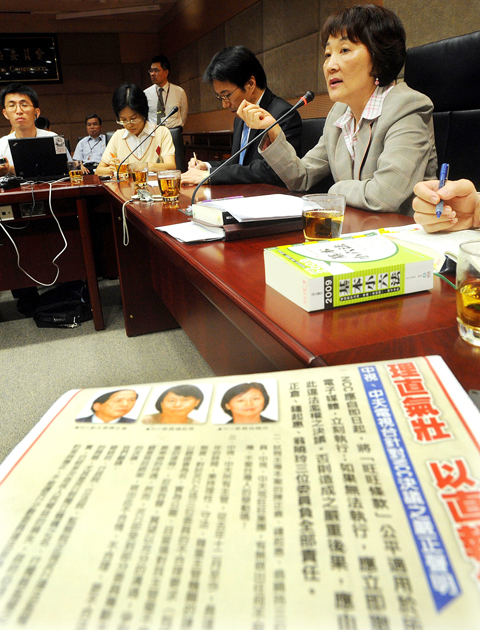Chinese Nationalist Party (KMT) Legislator Alex Tsai (蔡正元) yesterday proposed two bills to establish an exit mechanism for the state public prosecutor-general and National Communications Commission (NCC) members.
Tsai said his proposed amendment to the Organic Act of Court Organization (法院組織法) would authorize the legislature to approve or reject a “no-confidence vote” proposed by the minister of justice should the minister have difficulty working with the state public prosecutor-general.
Tsai said such an option was necessary because there had been a problem with the ranking of the justice minister and the state public prosecutor-general because of how they were nominated.

PHOTO: LIN CHENG-KUNG, TAIPEI TIMES
The president nominates the state public prosecutor-general and the nomination is approved by the legislature, while the premier nominates the justice minister, whose appointment is approved by the president.
Tsai’s proposal would require either the justice minister to either resign or propose a no-confidence vote to resolve a conflict with the prosecutor-general.
Tsai’s proposed amendment to the Organic Act of the NCC (國家通訊傳播委員會組織法) would introduce a similar mechanism for the commission’s chairman, vice chairman or members.
Under this proposal, the chairman, vice chairman or NCC members would have to immediately tender their resignation to the premier after a no-confidence vote proposed by the premier or if one-fourth of the commission members wins the support of more than half of the members.
Tsai said changes were needed to the NCC law because the commission’s handling of the China-based Want Want Group’s takeover of China Television Co (CTV) and CTiTV in the past two weeks was “controversial.”
The commission approved the takeover last Wednesday but set several conditions, including barring the management, directors and supervisors from either TV station concurrently holding a similar position at the other station.
The commission ruled that each network should have at least one independent board director without an affiliation to either the Want Want Group or the China Times Group, the two stations’ parent firm.
The China Times Group was purchased by the Want Want Group last year.
The NCC also stipulated that the two stations’ advertising, sales and programming departments must be separate, and each network must generate its own programming.
In addition, the two networks are not allowed to jointly bid for advertising contracts.
The China Times Group has accused the NCC of abusing its authority.

The Mainland Affairs Council (MAC) today condemned the Chinese Communist Party (CCP) after the Czech officials confirmed that Chinese agents had surveilled Vice President Hsiao Bi-khim (蕭美琴) during her visit to Prague in March last year. Czech Military Intelligence director Petr Bartovsky yesterday said that Chinese operatives had attempted to create the conditions to carry out a demonstrative incident involving Hsiao, going as far as to plan a collision with her car. Hsiao was vice president-elect at the time. The MAC said that it has requested an explanation and demanded a public apology from Beijing. The CCP has repeatedly ignored the desires

Many Chinese spouses required to submit proof of having renounced their Chinese household registration have either completed the process or provided affidavits ahead of the June 30 deadline, the Mainland Affairs Council (MAC) said on Thursday. Of the 12,146 people required to submit the proof, 5,534 had done so as of Wednesday, MAC deputy head and spokesperson Liang Wen-chieh (梁文傑) said. Another 2,572 people who met conditions for exemption or deferral from submitting proof of deregistration — such as those with serious illnesses or injuries — have submitted affidavits instead, he said. “As long as individuals are willing to cooperate with the legal

The Ma-anshan Nuclear Power Plant’s license has expired and it cannot simply be restarted, the Executive Yuan said today, ahead of national debates on the nuclear power referendum. The No. 2 reactor at the Ma-anshan Nuclear Power Plant in Pingtung County was disconnected from the nation’s power grid and completely shut down on May 17, the day its license expired. The government would prioritize people’s safety and conduct necessary evaluations and checks if there is a need to extend the service life of the reactor, Executive Yuan spokeswoman Michelle Lee (李慧芝) told a news conference. Lee said that the referendum would read: “Do

Taiwan's Vice President Hsiao Bi-khim (蕭美琴) said Saturday that she would not be intimidated by the Chinese Communist Party (CCP), following reports that Chinese agents planned to ram her car during a visit to the Czech Republic last year. "I had a great visit to Prague & thank the Czech authorities for their hospitality & ensuring my safety," Hsiao said on social media platform X. "The CCP's unlawful activities will NOT intimidate me from voicing Taiwan's interests in the international community," she wrote. Hsiao visited the Czech Republic on March 18 last year as vice president-elect and met with Czech Senate leadership, including